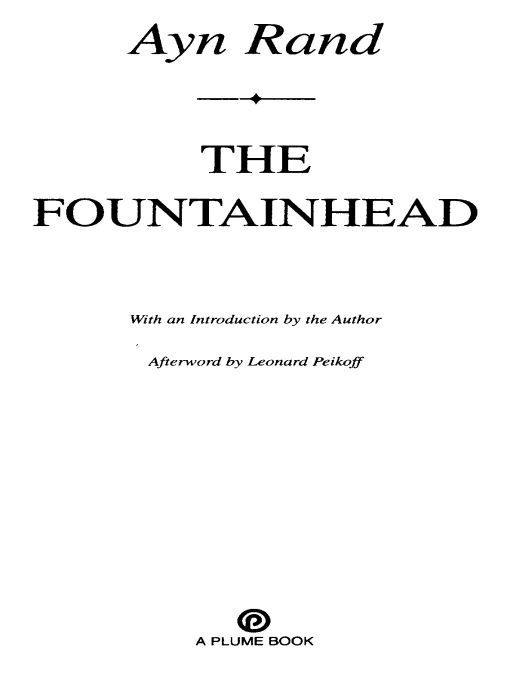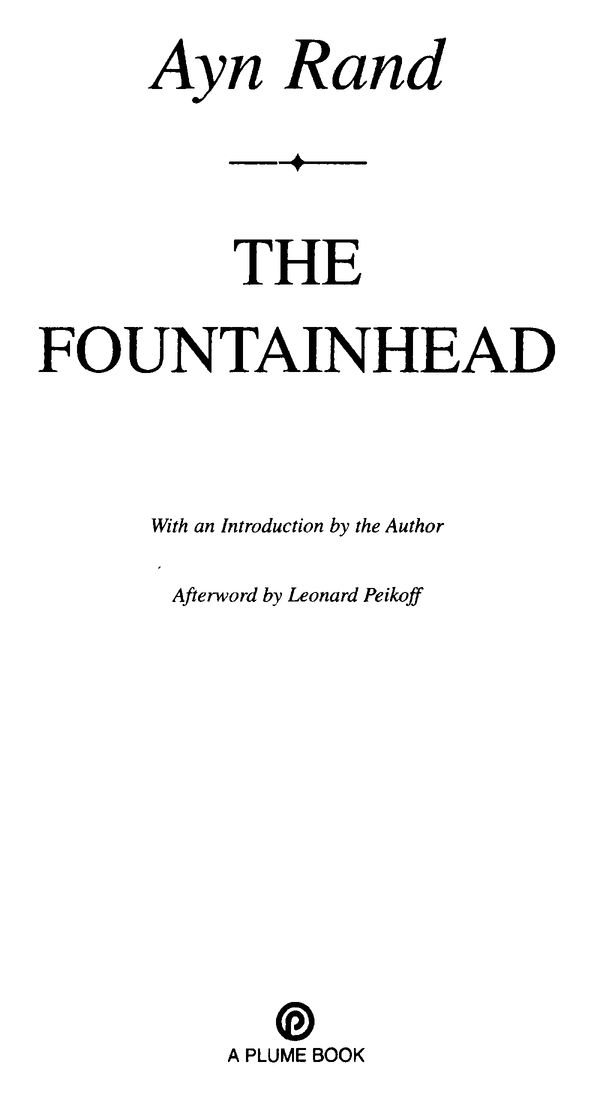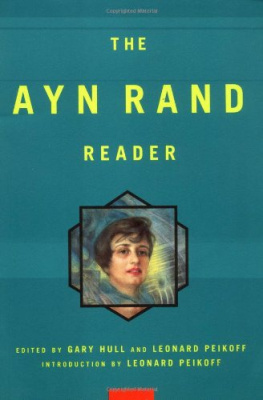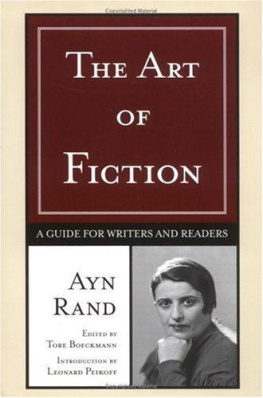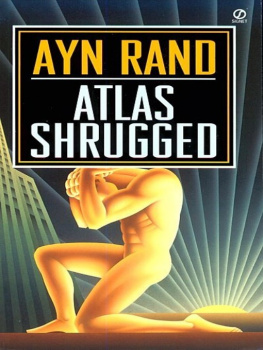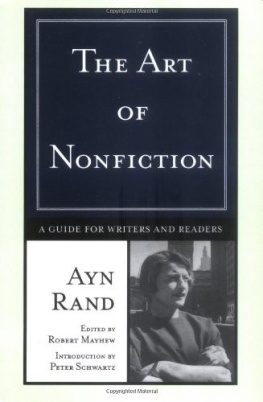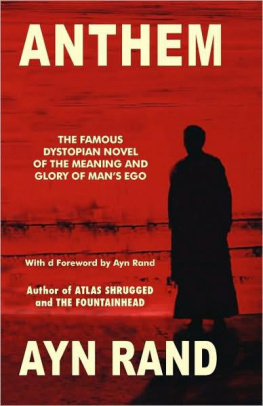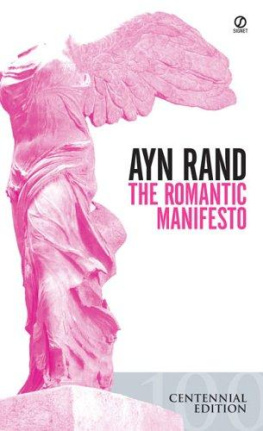Table of Contents
THE WRITINGS OF AYN RAND
FICTION
Atlas Shrugged
The Fountainhead
We the Living
Anthem
The Early Ayn Rand
Night of January 16th
PHILOSOPHY
General
Objectivism: The Philosophy of Ayn Rand by Dr. Leonard Peikoff
The Ayn Rand Lexicon
The Ayn Rand Reader
Philosophy: Who Needs It?
The Voice of Reason
For the New Intellectual
The Ominous Parallels by Dr. Leonard Peikoff
The Virtue of Selfishness
Epistemology
An Introduction to Objectivist Epistemology
Politics/Economics
Capitalism: The Unknown Ideal
Return of the Primitive
Art, Literature, and Letters
The Romantic Manifesto
The Art of Fiction
The Art of Nonfiction
Journals of Ayn Rand
Letters of Ayn Rand
To Frank OConnor
I offer my profound gratitude to the great profession of architecture and its heroes who have given us some of the highest expressions of mans genius, yet have remained unknown, undiscovered by the majority of men. And to the architects who gave me their generous assistance in the technical matters of this book.
No person or event in this story is intended as a reference to any real person or event. The titles of the newspaper columns were invented and used by me in the first draft of this novel. They were not taken from and have no reference to any actual newspaper columns or features.
Ayn Rand
March 10, 1943
AUTHORS INTRODUCTIONto the 1968 Edition
Many people have asked me how I feel about the fact that The Fountainhead has been in print for twenty-five years. I cannot say that I feel anything in particular, except a kind of quiet satisfaction. In this respect, my attitude toward my writing is best expressed by a statement of Victor Hugo: If a writer wrote merely for his time, I would have to break my pen and throw it away.
Certain writers, of whom I am one, do not live, think or write on the range of the moment. Novels, in the proper sense of the word, are not written to vanish in a month or a year. That most of them do, today, that they are written and published as if they were magazines, to fade as rapidly, is one of the sorriest aspects of todays literature, and one of the clearest indictments of its dominant esthetic philosophy: concrete-bound, journalistic Naturalism which has now reached its dead end in the inarticulate sounds of panic.
Longevitypredominantly, though not exclusivelyis the prerogative of a literary school which is virtually non-existent today: Romanticism. This is not the place for a dissertation on the nature of Romantic fiction, so let me statefor the record and for the benefit of those college students who have never been allowed to discover itonly that Romanticism is the conceptual school of art. It deals, not with the random trivia of the day, but with the timeless, fundamental, universal problems and values of human existence. It does not record or photograph; it creates and projects. It is concernedin the words of Aristotlenot with things as they are, but with things as they might be and ought to be.
And for the benefit of those who consider relevance to ones own time as of crucial importance, I will add, in regard to our age, that never has there been a time when men have so desperately needed a projection of things as they ought to be.
I do not mean to imply that I knew, when I wrote it, that The Fountainhead would remain in print for twenty-five years. I did not think of any specific time period. I knew only that it was a book that ought to live. It did.
But that I knew it over twenty-five years agothat I knew it while The Fountainhead was being rejected by twelve publishers, some of whom declared that it was too intellectual, too controversial and would not sell because no audience existed for itthat was the difficult part of its history; difficult for me to bear. I mention it here for the sake of any other writer of my kind who might have to face the same battleas a reminder of the fact that it can be done.
I will not retell here the story of the publication of The Fountainhead. But it would be impossible for me to discuss The Fountainhead or any part of its history without mentioning the man who made it possible for me to write it: my husband, Frank OConnor.
In a play I wrote in my early thirties, Ideal, the heroine, a screen star, speaks for me when she says: I want to see, real, living, and in the hours of my own days, that glory I create as an illusion. I want it real. I want to know that there is someone, somewhere, who wants it, too. Or else what is the use of seeing it, and working, and burning oneself for an impossible vision? A spirit, too, needs fuel. It can run dry.
Frank was the fuel. He gave me, in the hours of my own days, the reality of that sense of life which created The Fountainheadand he helped me to maintain it over a long span of years when there was nothing around us but a gray desert of people and events that evoked nothing but contempt and revulsion. The essence of the bond between us is the fact that neither of us has ever wanted or been tempted to settle for anything less than the world presented in The Fountainhead. We never will.
If there is in me any touch of the Naturalistic writer who records real-life dialogue for use in a novel, it has been exercised only in regard to Frank. For instance, one of the most effective lines in The Fountainhead comes at the end of Part II, when, in reply to Tooheys question: Why dont you tell me what you think of me? Roark answers: But I dont think of you. That line was Franks answer to a different type of person, in a somewhat similar context. Youre casting pearls without getting even a pork chop in return, was said by Frank to me, in regard to my professional position. I gave that line to Dominique at Roarks trial.
I did not feel discouragement very often, and when I did, it did not last longer than overnight. But there was one evening, during the writing of The Fountainhead, when I felt so profound an indignation at the state of things as they are that it seemed as if I would never regain the energy to move one step farther toward things as they ought to be. Frank talked to me for hours, that night. He convinced me of why one cannot give up the world to those one despises. By the time he finished, my discouragement was gone; it never came back in so intense a form.
I had been opposed to the practice of dedicating books; I had held that a book is addressed to any reader who proves worthy of it. But, that night, I told Frank that I would dedicate The Fountainhead to him because he had saved it. And one of my happiest moments, about two years later, was given to me by the look on his face when he came home, one day, and saw the page-proofs of the book, headed by the page that stated in cold, clear, objective print: To Frank OConnor.
These are some of the reasons why, for me, the most profound personal meaning of this new, anniversary edition is the fact that its jacket carries the reproduction of a painting by Frank. It is like the completion, the proper climax of this books history.
That painting was not done for The Fountainhead. It represents Franks version of a sunrise we had seen once in San Francisco. His title for the painting is

